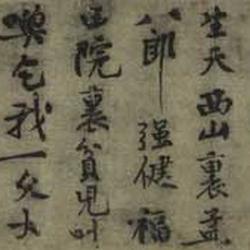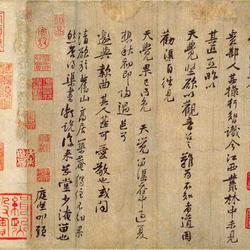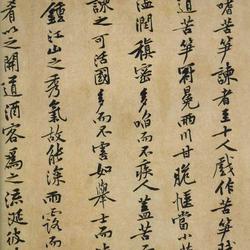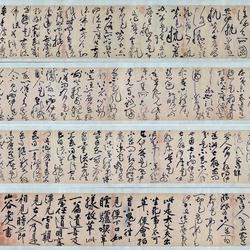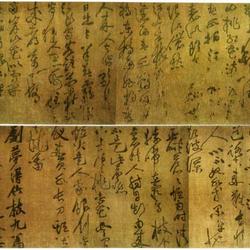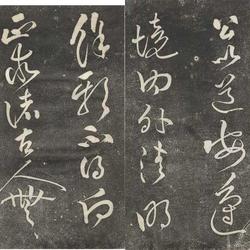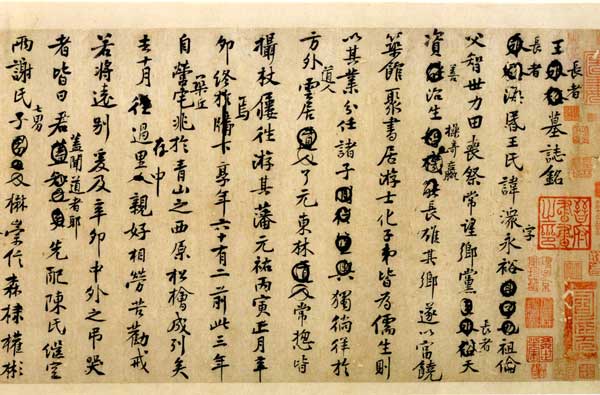
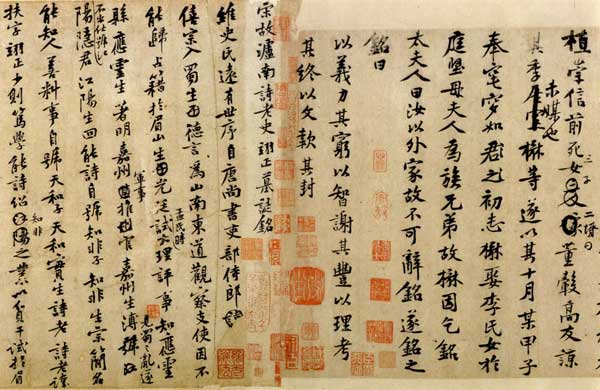
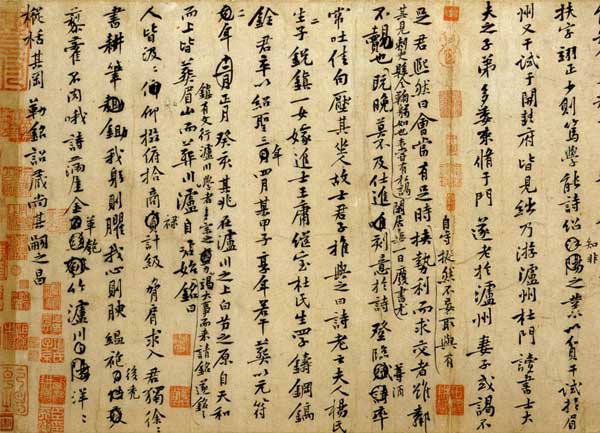
"Wang Shi Er's Epitaph Volume" Paper 30.3X78.5l cm 33.5X65.3 cm Collection of the Tokyo National Museum, Japan
This volume is a combination of the "Manuscript of the Epitaph of Elder Wang" and the "Manuscript of the Epitaph of Yizheng, the Old Shi of Lunan Poetry in Song Dynasty". The respective books were written when Huang Tingjian was between forty and forty-five years old, and between fifty-five and sixty years old.
Explanation of "The Manuscript of Elder Wang's Epitaph":
The epitaph of the elder Wang: The elder Haihun Wang's family name is Yongyu. Zu Lun, Father Zhi, Shi Litian, often visit the hometown party during funerals. The elders are gifted and good at managing their lives, and they can do extraordinary things to win. They make their hometown prosperous and prosperous. He built a library and collected books, and became a wandering scholar. His children were all Confucian scholars. Then he divided his career among the disciples and wandered alone outside the country. The Taoist Yun lived in Yuan, Donglin, and Changjie, and they all took pictures of Zanggui to visit his vassal. Yuanyou died on Xinmao in the first month of Bingyin at the age of sixty-two. In the past three years, I built a hill on the western plain of Qingshan Mountain, and lined it up with pines and junipers. We will spend the next ten months together and stay close to each other, working hard and admonishing each other, but we will be far away from each other. Yuan and Xinmao, the mourners at home and abroad, are all called Jun Gai who heard the Tao! He was first married to the Chen family, followed by two Xie families, seven sons, Mao, Chongxin, Sen, Di, Quan, Bin, Zhi, Chong Die before the letter. There are three daughters, the second son-in-law is Dong Hub and Gao Youliang, and they are not matchmakers. Zhu and others then followed the tenth year of the lunar month to honor the zodiac as the original intention. Mao married a daughter of the Li family, and Yu Tingjian's mother and wife were brothers in the family. Therefore, when Mao asked for an inscription, the dowager said: "You are from a foreign family, so you can't inscribe." Then inscribe it. The inscription says: Use righteousness to strengthen your poverty, use wisdom to thank you for your abundance, use reason to test your end, and use literature to reward you.
Explanation of the "Manuscript of the Epitaph of Yizheng, the Old Shi of Lunan Poetry in Song Dynasty":
The epitaph of Yizheng, the old Lunan poet in the Song Dynasty: The Wei Shi family has a long history. He came to Shu from Xizong, the Minister of the Ministry of Officials of the Tang Dynasty, and Sheng Deyan served as the observation envoy of Shannan East Road. Because he could not return, he settled in Meishan. When he was born in Guangting and Mengshi, he tried to judge affairs in Dali and got to know Yingling County. Ying Lingsheng was born in the Ming Dynasty and was promoted to a military official in Jiazhou. Pu was born in Jiazhou. Seeing the chaos in Shu, he stopped serving as an official and was named Jiangyang Yinjun. When Jiang Yang was born, he was good at poetry and called himself Zhi Feizi. Zhifeishengzongjian, named Neng, knows people well and knows things well, and calls himself Tianhezi. Heaven and earth give birth to poetry. The old poet is taboo Fu, and his character is Yizheng. The younger one is dedicated to learning and poetry, which shows his career of knowing what is wrong. He tried to be a poor man in Meizhou and in Kaifeng Prefecture, but he was poor in both cases. Then he traveled to Luzhou and studied in Dumen. Most of the children of scholar-bureaucrats were assigned to study in the sect, and they grew up in Luzhou. If the wife may not pay enough attention, Jun Xiran said: "We will meet when we have enough." He should be self-reliant and do not take anything rashly. There are those who use snobbery to seek friendship, even if they are neighbors. When he saw the governor and county magistrate, he bowed as usual and never paid a private visit. It's too late, there's no time to advance in officialdom. I spend no time in my spare time reading books, especially poetry. When he comes to the wine table, he often speaks out good sentences. Someone was sitting on him, so the scholar and gentleman pushed him and said: "The old poet said." His wife, Mrs. Yang, gave birth to two sons, Rui and Zhen. One daughter married Jinshi Wang Yong. The second wife, the Du family, gave birth to four sons: Zhu, Gang, Hao and Quan. Jun died in April of the third year of Shaosheng, at a certain age. He was buried in Guihai, the first month of the second year of Yuanfu, and his omen was above Luchuan, at the source of Baifang. During the day, both He and Shang were buried in Meishan, and Sichuan and Lu Zijun were buried. There were literary circles in the town, and there were many scholars from Luchuan. They worked hard for important things and came to ask for inscriptions. Then inscribe it. The inscription says: Everyone is eager to learn, looking up and picking up things, business people are calculating their salary, and they are asking for help with their shoulders. You are alone, writing and plowing with pen and hoe, while I am bowing and bowing, and my heart is plump. The back of the robe is bald, the quinoa has no flesh, the house is full of poems, and the golden leather is covered with bamboo. The Luchuan River is vast, the trees are growing on the hills, and the imperial edicts are inscribed in order to ensure the prosperity of his heirs.

